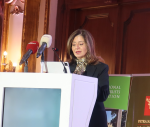You are here
Anti-smoking campaigners welcome tax hike on tobacco
By Ahmed Bani Mustafa - Feb 10,2017 - Last updated at Feb 10,2017

A recent Cabinet decision stipulates raising the special tax on cigarettes by JD0.457 to JD1.205 according to the packet price (Photo by Amjad Ghsoun)
AMMAN — Anti-tobacco movements and activists praised the government's decision on Wednesday to raise the prices of cigarettes, while smokers had mixed reactions.
The decision stipulates raising the special tax on cigarettes by JD0.457 to JD1.205 according to the packet price.
On Thursday, the Income and Sales Tax Department (ISTD) said that the decision to hike the prices of tobacco and fizzy drinks will not go into effect until an amending by-law on the special tax is passed and published in the Official Gazette, the Jordan News Agency, Petra, reported.
The ISTD called on vendors to abide by the current prices to avoid legal action.
Jordanian Anti-smoking Society President and Anti-Smoking Arab Council Secretary General Mohammed Shreem commended the decision, saying the price is the main pillar in the anti-tobacco campaign, the effect of which is proven by international studies.
However, Shreem said, the government should deal with smoking in a holistic approach, taking into consideration the implementation of the Public Health Law and curbing tobacco smuggling, which he expected to increase.
Larissa Al Uar, a founding member and the secretary general of the Tobacco-Free Jordan Association, told The Jordan Times that "raising the taxes on tobacco is a step in the right direction to protect our youth from the claws of the tobacco industry".
“During awareness-raising lectures that the association holds at schools, some students have told us that they started smoking because they could afford to buy tobacco," said Al Uar.
In addition to the health and social benefits, the decision will contribute to the national economy by reducing public health expenditure, Al Uar said, calling on the government to use the revenues for anti-smoking awareness campaigns and for the treatment of cancer.
"Many Jordanian smokers quit once they move to countries where tobacco is very expensive," the activist said, citing WHO's statistics that state only 20 per cent of smokers live in developed countries.
Some diseases caused by smoking could only be found among elderly people in developed countries, while in Jordan, they are common among the young population, Al Uar said.
For Amer Nizami, who is a smoker, the decision is of no help to him to quit, but younger people might benefit, as it will be difficult for them to buy cigarettes.
Anas Shishani, another smoker, expressed his dissatisfaction with the decision, as tobacco is already expensive and children can still buy single cigarettes at affordable prices.
"The price is not everything in the anti-tobacco campaign. In developed countries, income is high, which makes the price less significant without implementing comprehensive health laws and regulations," Shishani added.
Mohammad Ajour, however, said he agreed with the decision to raise cigarette prices, noting that tobacco is not an essential commodity.














